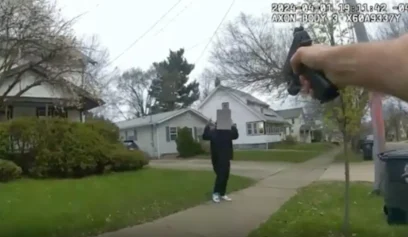Ollie Gordon of Blue Island, Illinois, is the cousin of Emmett Till, and she’s being cautiously optimistic about the Emmett Till Anti-Lynching Act that passed the House of Representatives on Monday, 422 yeas to three nays.
“I’m not sure what Emmett would say, but I’m sure he would be pleased with it. I’m sure his mother would feel like Emmett’s death would not be in vain and her hard work to keep his legacy alive and fight for some kind of recognition or justice if I might say,” Gordon said.
What Happened to Emmett Till?
Gordon’s cousin, Emmett Till was 14 years old on Aug. 28, 1955, when he died after being lynched in Money, Mississippi. Till was visiting relatives in Mississippi from his hometown in Chicago for the summer.
He was kidnapped from his relatives’ home at night, beaten, brutally murdered, and thrown into the Tallahatchie River by several white men who thought he had whistled at a white woman at Bryant’s Grocery store. The woman’s husband and his half-brother would be tried for Till’s lynching, however, an all-white jury returned a verdict of not guilty for Till’s murder.
Anti-Lynching Bill a Step Closer to Becoming Federal Law
The bill introduced by Illinois Rep. Bobby Rush outlines how a crime can be prosecuted as a lynching when a conspiracy to commit a hate crime results in death or serious bodily injury. The types of offenses include kidnapping, aggravated sexual abuse, or an attempt to kill. The maximum penalty is 30 years in prison.
Congress has tried and failed to pass anti-lynching legislation nearly 200 times, the Washington Post reports. Rush introduced a similar bill before, but it failed to pass the Senate in 2020 which is why Gordon is withholding her full sense of hope.
“They thought they had enough votes but Rand Paul decided there was no need for an antilynching bill because there was a law on the books for murder already so of course that was a disappointment,” Gordon said.
This time around, Sen. Rand Paul plans to support the bill once in the Senate, he said in a tweet Wednesday, “We owed it to Marie Thompson, to Emmett Till, and to the over 4,700 other victims of lynching in this country to get the law that honors them right.”
The three Republicans who voted against the Emmett Till Anti-Lynching bill are Andrew Clyde of Georgia, Thomas Massie of Kentucky, and Chip Roy of Texas. In statements released explaining their no votes, Clyde said, “Lynching is an evil act of violence that is already against the law at the federal level; it’s first-degree murder.”
Rep. Roy called lynching a “heinous crime” but says the Emmett Till bill “doesn’t have anything to do with lynching.”
Rep. Massie said in a series of tweets, “lynching is already illegal … and the bill creates another federal crime of conspiracy which I’m concerned could be enforced overbroadly on people who are not perpetrators of a crime.”
Gordon believes Congress has struggled to pass federal anti-lynching laws because of America’s deep-rooted history of racism. “I think it’s been difficult because of the mindset of people and the value of life that’s put on a Black man or a Black woman coming through from slavery way back in the 1800s, they saw us less than human,” she said.
CNN reports that Senate Democrats hope to pass the Emmett Till Anti-Lynching Act by unanimous consent, which means all 100 senators must pass the legislation before moving on to President Biden to be signed into law.
Gordon acknowledges the landscape in the Senate in 2022 in a post-George Floyd era, things may be different. “I think it will be different this time around because I think people see hate crimes did not stop in 1955, they are being able to see them and witness them on TV with George Floyd, with this man’s knee on his neck, to me it’s saying, we don’t have to hang them from trees anymore, there’s another way to take their last breath,” she said.
More news from our partners:


